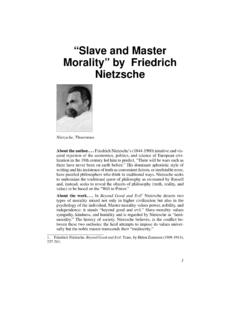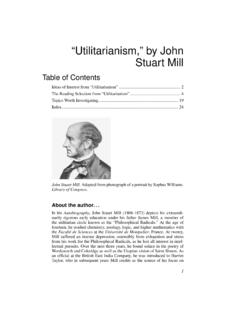Transcription of “Pragmatic Theory of Truth” by William James
1 Pragmatic Theory ofTruth by William JamesWilliam James , NIHA bout the author.. William James (1842-1910) is perhaps the mostwidely known of the founders of pragmatism . Historically, hisPrinciplesof Psychologywas the first unification of psychology as a philosophicalscience. As a teacher of philosophy, he was a colleague of both JosiahRoyce and George Santayana. Once Royce was asked to substitute teachfor James in James Harvard philosophy class which, at the time, happenedto be studying Royce s text. Supposedly, as Royce picked up James copyof his text in the lecture hall, he hesitated briefly, and then noted to theclass that James had written in the margin of the day s reading, Damnfool! About the work..In hisPragmatism,1 William James characterizestruth in terms of usefulness and acceptance. In general, on his view, truthis found by attending to the practical consequences of ideas.
2 To say thattruth is mere agreement of ideas with matters of fact, according to James ,is incomplete, and to say that truth is captured by coherence is not to dis-tinguish it from a consistent falsity. In a genuine sense, James believes weconstruct truth in the process of successful living in the world: truth is : A New name for some Old ways of thinking . NewYork: Longman Green and Co., Pragmatic Theory of Truth by William Jamesno sense absolute. Beliefs are considered to be true if and only if they areuseful and can be practically applied. At one point in his works, Jamesstates, .. the ultimate test for us of what a truth means is the conduct itdictates or inspires. Certainly, one difficulty in understanding James liesin the interpretation of his rhetorical the reading.. What, in short, is the truth s cash-value in experiential terms? Ideas of Interest James view, what are three stages in the normal development of atheory?
3 Can you think of examples of Theory -development in accor-dance with this paradigm? James critique of the correspondence Theory of truth. Is hischaracterization of the correspondence Theory an oversimplification? does James define a true idea? Does his characterization clearlydistinguish a true idea from a false idea? James thesis concerning the pragmatic Theory of truth. Whatdo the words verification and validation themselves pragmaticallymean? writes that our ideas agree with reality. How does this de-scription differ from the suggestion that true ideas correspond withfacts? whether or not there is any difference between the true andthe useful for James . How is the verification process related to thisinterpretation of truth? to James , what are the main objections of rationalism topragmatism? How does James answer these objections?2 Reading For Philosophical Inquiry: A Brief Introduction Pragmatic Theory of Truth by William the notions of the true, the right, and the good as describedby James at the end of this reading Reading Selection fromPragmatism[Ideas as Copies of Reality]I fully expect to see the pragmatist view of truth run through the classicstages of a Theory s career.
4 First, you know, a new Theory is attacked asabsurd; then it is admitted to be true, but obvious and insignificant; finallyit is seen to be so important that its adversaries claim that they themselvesdiscovered it. Our doctrine of truth is at present in the first of these threestages, with symptoms of the second stage having begun in certain quar-ters. I wish that this lecture might help it beyond the first stage in the eyesof many of , as any dictionary will tell you, is a property of certain of our ideas. Itmeans their agreement, as falsity means their disagreement, with real-ity. Pragmatists and intellectualists both accept this definition as a matterof course. They begin to quarrel only after the question is raised as towhat may precisely be meant by the term agreement, and what by theterm reality, when reality is taken as something for our ideas to answering these questions the pragmatists are more analytic and painstak-ing, the intellectualists more offhand and irreflective.
5 The popular notionis that a true idea must copy its reality. Like other popular views, this onefollows the analogy of the most usual experience. Our true ideas of sensi-ble things do indeed copy them. Shut your eyes and think of yonder clockon the wall, and you get just such a true picture or copy of its dial. Butyour idea of its works (unless you are a clock-maker) is much less of acopy, yet it passes muster, for it in no way clashes with the reality. Eventho it should shrink to the mere word works, that word still serves youtruly; and when you speak of the time-keeping function of the clock,or of its spring s elasticity, it is hard to see exactly what your ideas For Philosophical Inquiry: A Brief Introduction3 Pragmatic Theory of Truth by William JamesFrom the reading.. when you speak of the time-keeping function of the clock, orof its spring s elasticity, it is hard to see exactly what your ideascan copy.
6 You perceive that there is a problem here. Where our ideas cannot copydefinitely their object, what does agreement with that object mean? Someidealists seem to say that they are true whenever they are what God meansthat we ought to think about that object. Others hold the copy-view allthrough, and speak as if our ideas possessed truth just in proportion asthey approach to being copies of the Absolute s eternal way of views, you see, invite pragmatistic discussion. But the great as-sumption of the intellectualists is that truth means essentially an inert staticrelation. When you ve got your true idea of anything, there s an end of thematter. You re in possession; youknow; you have fulfilled your thinkingdestiny. You are where you ought to be mentally; you have obeyed yourcategorical imperative; and nothing more need follow on that climax ofyour rational destiny.
7 Epistemologically you are in stable equilibrium.[Truth as Verification] pragmatism , on the other hand, asks its usual question. Grant an idea orbelief to be true, it says, what concrete difference will its being truemake in anyone s actual life? How will the truth be realized? What expe-riences will be different from those which would obtain if the belief werefalse? What, in short, is the truth s cash-value in experiential terms? The moment pragmatism asks this question, it sees the answer:True ideasare those that we can assimilate, validate, corroborate and verify. Falseideas are those that we is the practical difference it makes tous to have true ideas; that, therefore, is the meaning of truth, for it is allthat truth is thesis is what I have to defend. The truth of an idea is not a stagnantproperty inherent in it. Truthhappensto an idea.
8 Itbecomestrue, ismadetrue by events. Its verityisin fact an event, a process: the process namelyof its verifying itself, its veri-fication. Its validity is the process of its For Philosophical Inquiry: A Brief Introduction Pragmatic Theory of Truth by William JamesBut what do the words verification and validation themselves pragmati-cally mean? They again signify certain practical consequences of the ver-ified and validated idea. It is hard to find any one phrase that characterizesthese consequences better than the ordinary agreementformula just suchconsequences being what we have in mind whenever we say that our ideas agree with reality. They lead us, namely, through the acts and other ideaswhich they instigate, into or up to, or towards, other parts of experiencewith which we feel all the while such feeling being among our poten-tialities that the original ideas remain in agreement.
9 The connexions andtransitions come to us from point to point as being progressive, harmo-nious, satisfactory. This function of agreeable leading is what we mean byan idea s verification. Such an account is vague and it sounds at first quitetrivial, but it has results which it will take the rest of my hour to me begin by reminding you of the fact that the possession of truethoughts means everywhere the possession of invaluable instruments ofaction; and that our duty to gain truth, so far from being a blank commandfrom out of the blue, or a stunt self-imposed by our intellect, can accountfor itself by excellent practical reasons.[Truth as the Useful]The importance to human life of having true beliefs about matters of fact isa thing too notorious. We live in a world of realities that can be infinitelyuseful or infinitely harmful. Ideas that tell us which of them to expectcount as the true ideas in all this primary sphere of verification, and thepursuit of such ideas is a primary human duty.
10 The possession of truth, sofar from being here an end in itself, is only a preliminary means towardsother vital satisfactions. If I am lost in the woods and starved, and findwhat looks like a cow-path, it is of the utmost importance that I shouldthink of a human habitation at the end of it, for if I do so and follow it,I save myself. The true thought is useful here because the house whichis its object is useful. The practical value of true ideas is thus primarilyderived from the practical importance of their objects to us. Their objectsare, indeed, not important at all times. I may oil another occasion have nouse for the house; and then my idea of it, however verifiable, will be prac-tically irrelevant, and had better remain latent. Yet since almost any objectmay some day become temporarily important, the advantage of having ageneral stock ofextratruths, of ideas that shall be true of merely possiblesituations, is obvious.







